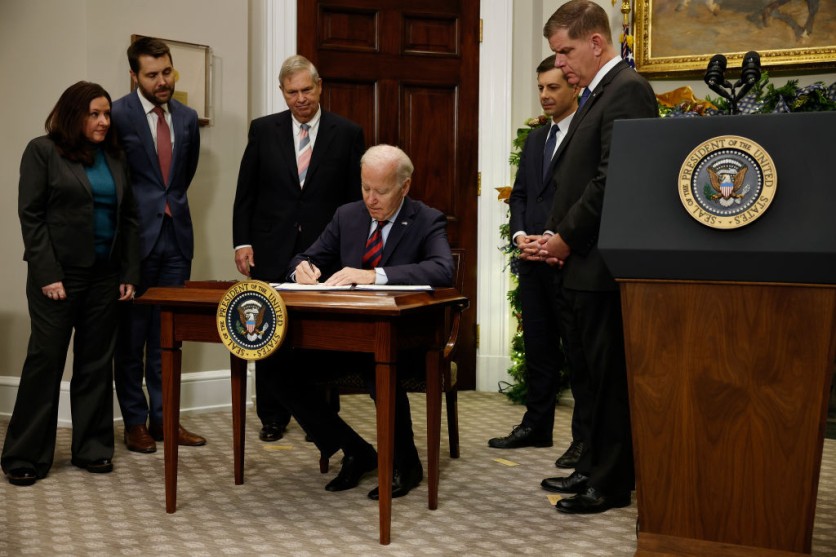Electric vehicle charger manufacturers and operators in the US prepares for a slowdown in production and deployment to comply with Made in America terms, as reported by Reuters.

(Photo : by Chip Somodevilla/Getty Images)
WASHINGTON, DC - DECEMBER 02: U.S. President Joe Biden signs bipartisan legislation averting a rail workers strike with (L-R) Director of Made in America at the Office of Management and Budget Celeste Drake, National Economic Council Director Brian Deese, Agriculture Secretary Tom Vilsack, Transportation Secretary Pete Buttigieg and Labor Secretary Marty Walsh in the Roosevelt Room at the White House on December 02, 2022 in Washington, DC.
Last month, the White House laid out rules in an effort to build an electric-friendly highway system by 2030, which can tackle climate change and create local jobs.
The requirements to start assembling chargers at US factories and using US-made iron or steel enclosures caught the EV charging industry off guard.
Also read: Space X CEO Elon Musk uses Made In America speech to drum up U.S. Defense business
Could Potentially Hurt the EV Industry?
Some state officials and companies who are responsible for federal turns warn that the country lacks the domestic production capacity, which means strict reinforcement will slow the rollout, increase costs and hurt the industry.
The requirement for 55% of the cost of components to be sourced from the US was delayed until 2024, but it is likely that other terms of the agreement will be delayed too.
It usually takes between one and one and a half years to switch production from another nation. XCharge, one of the major vendors of EV quick chargers in the EU, is attempting to speed up the setting up of a factory in the US in order to comply with the regulations, which could cause the prices to rise by up to thirty percent.
The majority of federal money will be allocated to states, while local governments, counties, and Native American tribes will have the opportunity to apply for the remaining funds.
The Arizona Department of Transportation is in charge of creating charging stations and will receive $76.5 million in federal money to do so over the next five years.
The agreement also states that automakers must provide an adequate number of charging stations for their vehicles and a sufficient supply of replacement parts.
This is to ensure EV owners have access to the necessary infrastructure and resources they need. Additionally, automakers must establish a network of certified service providers with appropriate training staff who can competently repair EVs.
In addition to these requirements, vehicle manufacturers are expected to increase electric cars' range and power capacity over time so that drivers can travel farther on each charge without sacrificing performance or safety features.
Furthermore, companies must invest more in research & development related towards advancing battery technology which promises longer life spans and faster recharge times than ever before seen from traditional lithium batteries used in most current models today.
Moreover, automakers need to continue investing heavily in research & development of battery technology so that EV owners can access longer-lasting batteries and faster charge times every time they plug their car in for recharging purposes. This also ensures safety measures remain a top priority for all users out on public roads during any journey taken by an EV driver.
Related article: Electric Vehicles Are Taking Over the US-Here's a Look at the Numbers

ⓒ 2026 TECHTIMES.com All rights reserved. Do not reproduce without permission.




